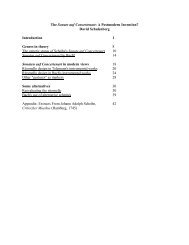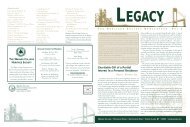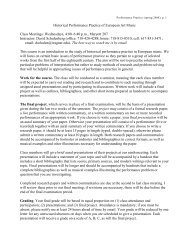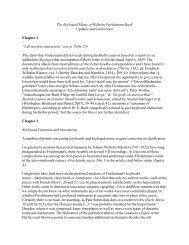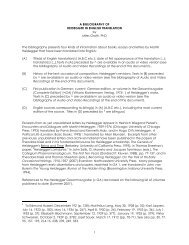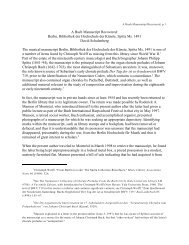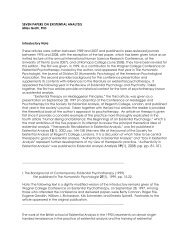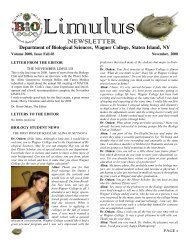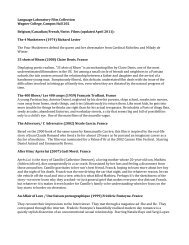download
download
download
You also want an ePaper? Increase the reach of your titles
YUMPU automatically turns print PDFs into web optimized ePapers that Google loves.
Schulenberg: Froberger, AMS 2006, p. 6<br />
passages, others to individual figures lasting just a beat or even less. Sometimes two identical<br />
musical figures have similar meanings, but not in every case. Clearly the annotator was careful to<br />
attach specific words to specific musical passages, but only sometimes does the effort yield<br />
precise matches. In the Dresden manuscript, no verbal account is attached, merely the one-word<br />
title Wasserfall. Evidently this title is explained by the account in the Berlin manuscript. But the<br />
precise narrative of events and their correlation with the music could be a later addition, not<br />
necessarily one made by the composer himself.<br />
This is a good moment for us to hear the allemande, recorded in a performance of mine<br />
from a year ago. [Click here for the recording.]<br />
The attachment of a detailed account to this particular piece is somewhat surprising<br />
because, by Froberger's standards, this allemande is not particularly vivid. Compared to the<br />
tombeau or even to an untitled allemande like that of Suite 7, the present allemande is rather<br />
bland, lacking remote modulations or substantial contrasts of rhythm or melody. Yet no other<br />
piece of Froberger's comes with so detailed an account. Froberger's other programmatic pieces do<br />
not seem to represent narratives, even when a short short account is attached. The tombeau for<br />
Blancrocher includes passages that are usually interpreted as the tolling of bells and the lutenist's<br />
fatal plunge down the stairs. Yet the order of these figures is wrong for a narrative, unless the<br />
final descending scale really signifies the burial of Blancrocher's body or, worse, the damnation<br />
of his soul. More likely, however, the tombeau and other laments represent only idealized images<br />
and emotional states associated with an event, not the events themselves. Most are generic<br />
laments for which the accompanying title or rubric serves as a sort of program note and is not<br />
organically connected with the music.<br />
Alexander Silbiger has asked: how seriously were these titles taken? Certainly by the<br />
eighteenth century it was understood that programmatic titles could be understood variously. But<br />
earlier Froberger sources already contain hints that some titles and rubrics were understood as<br />
examples of wit or irony; one may even have served as political satire. The gigue of Suite 13<br />
contains a cadenza-like passage which, in the Dresden and Berlin manuscripts, is to be played<br />
“slowly and with discretion, like the return of Cardinal Mazarin to Paris.” The Berlin version of<br />
the passage is shown in example 1. This is one of two rubrics that play on the word “discretion”;<br />
the Minoriten manuscript attaches another example to the opening movement of Suite 14.<br />
In Berlin and Dresden, the present gigue 13 is entitled “La rusée mazarinique,” that is,<br />
“Mazarin's Deception.” This seems to refer to the surreptitious way in which the first minister of<br />
the young Louis XIV re-entered France on Christmas Eve 1651, after his first exile during the<br />
12<br />
Fronde. In addition to the cadenza-like passage toward the end, the gigue is noteworthy for its<br />
unusual alternation between duple and triple notation; perhaps this shiftiness also has something<br />
to do with the title. In any case, the piece might have been a musical mazarinade, a political<br />
attack on the effective ruler of France. Support for this interpretation comes from the Berlin<br />
manuscript, which indicates that Froberger composed the allemande of the same suite at Paris for<br />
the Marquis de Termes. This Marquis de Termes served in the household of Gaston d'Orléans,<br />
12 See, e.g., Geoffrey Treasure, Mazarin: The Crisis of Absolutism in France (London:<br />
Routledge, 1995), 192–3. The date 1652, given by Rasch and Dirksen, “Eine neue Quelle,” 142,<br />
and accepted by Wollny, preface (p. xx), seems to reflect a later event.




